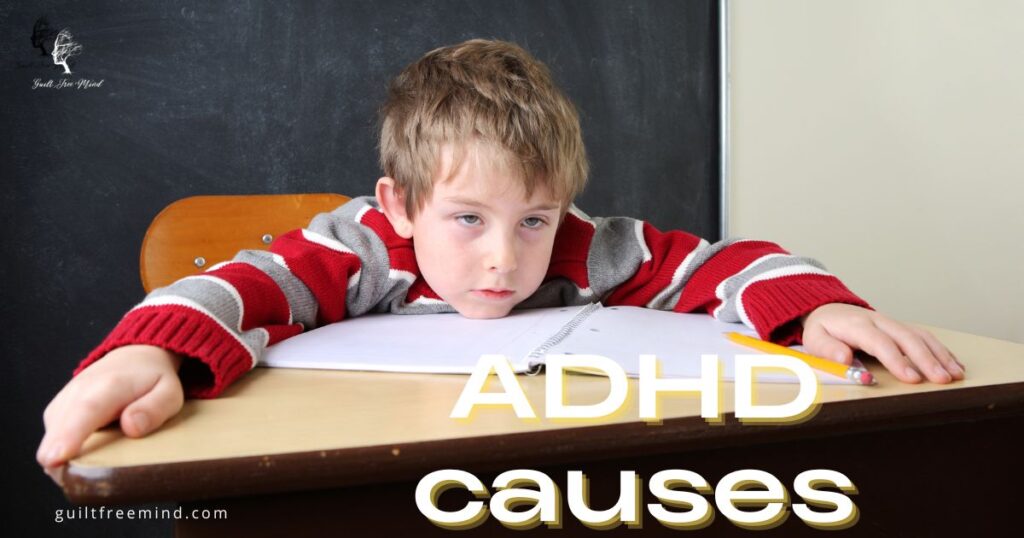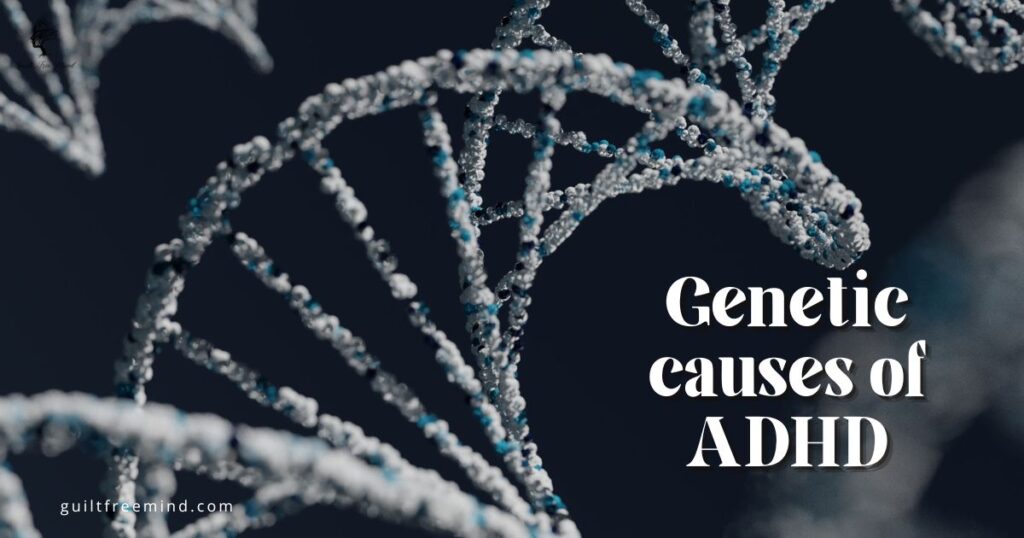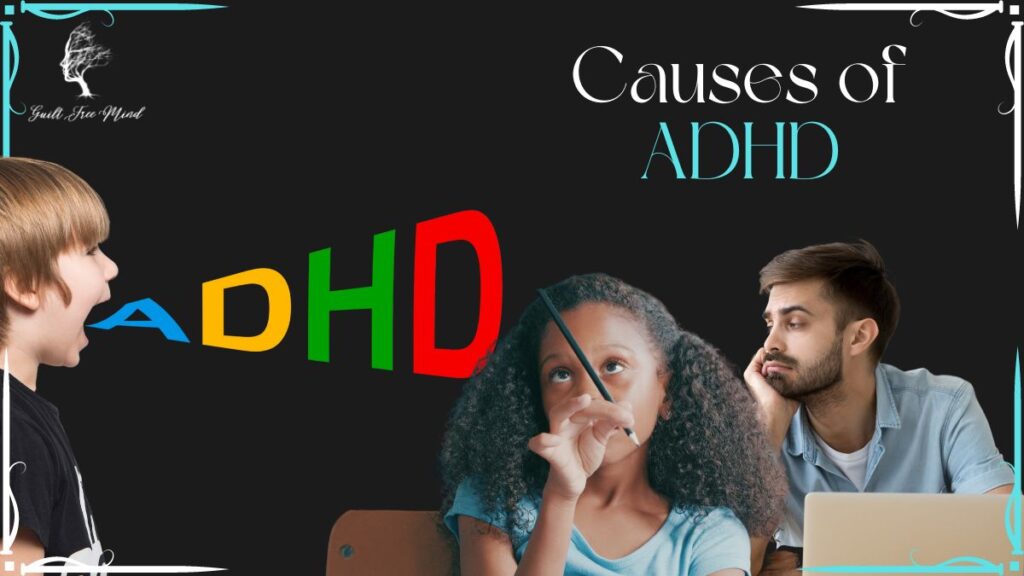Attention deficit hyperactivity disorder or ADHD is a chronic mental health condition. ADHD is known to affect millions of kids on a regular basis. It has also been shown to continue into adulthood. Unfortunately, there is no clear picture of ADHD causes in the first place. Therefore, this blog post will specifically focus on the causes of ADHD in children and adults.
In my previous blog post, I gave you an overview of what ADHD really is. In this one, I will be focusing on the ADHD causes. ADHD involves a combination of different problems like difficulty in sustaining attention, hyperactivity as well as impulsive behavior.
Table of Contents
ADHD causes
Many causes have been identified for ADHD. They range from genetics to environmental to psychosocial adversity. I will be discussing all of them in this blog post. However, before I get into the causes of ADHD, it is important that you understand the symptoms first. Therefore, let’s focus on the symptoms of ADHD.
ADHD symptoms
Kids who suffer from ADHD also show signs of troubled relationships, low self-esteem, and poor academic performance. Some kids also proceed to show the symptoms of ADHD even in adulthood. The symptoms may either be the same as they were when the person was a child, or they may evolve further. However, there are several coping strategies that can be put in place to help the person combat the symptoms of ADHD.

Many treatment strategies have been proposed by psychologists and psychiatrists for effectively dealing with ADHD symptoms. There are drugs that can combat most symptoms of ADHD as well. Even though treatment has not been observed to cure ADHD so far, it can help a person deal with their symptoms. Treatment options involve behavioral interventions and medications. The sooner ADHD is diagnosed, the sooner the person can take back control of their own life and put in strategies that can help them combat the symptoms of ADHD.
If you are interested in knowing more about ADHD, bipolar disorders, PTSD, stress, anxiety, depression, or any other kind of mental health issue, please subscribe to Guilt Free Mind. Your subscription will allow me to notify you about the release of all the new blog posts. Thus, you will stay updated about all the latest tips and tricks in the mental health world. If you like to watch videos, you should subscribe to the YouTube channel of Guilt Free Mind. Do not forget to ring the notification bell so that YouTube can notify you when there is a new video release.
Before I start to discuss ADHD causes, you need to understand the symptoms of ADHD.
Symptoms of ADHD
Symptoms of ADHD in kids
As the name suggests, kids who have ADHD primarily show problems with regard to inattention, impulsivity, hyperactivity, or a combination of all three. They may face specific problems with regard to paying attention and organizing their work, or they may show excessive restlessness and fidgety habits. Alternatively, they all may also show a lack of self-control and excessively impulsive behavior.
In the case of toddlers or children suffering from ADHD, the most common symptoms that are observed in the daycare, school, and home are:
- Extremely low attention span when doing schoolwork or playing.
- Facing trouble focusing on any kind of activity and easily getting distracted.
- Continuously squirming, fidgeting, or otherwise facing trouble in sitting still.
- Constantly needing to move and have a tendency to run around in the class.
- Engage in activity disruptively or loudly.
- Excessive or talking behavior and a habit of interrupting others.
- Engaging in any activity in a loud and disruptive manner.
Signs of ADHD in teens
As children with ADHD progress towards their teenage stages, the symptoms that they experience may undergo change. In certain cases, some symptoms may seem to be less problematic when the patient was toddler age. The person may also acquire new symptoms as the person reaches the teenage years. The new symptoms can arise depending on the changing responsibilities that the person is experiencing. During teenager years, adolescents suffering from ADHD may start to show other symptoms like:
- Having a hard time focusing on any kind of work like school work, part-time job etcetera
- Conduct silly mistakes at work
- Find it very hard to finish tasks like chores or schoolwork.
- Organization of the tasks and time management are particularly difficult.
- Frequently losing personal items and forgetting stuff.
- The teenager may display a symptom of avoiding tasks that require mental focus.
- Increased emotional sensitivity and frustration
- Trouble navigating familial and social relationships
- Increased conflicts with parents and people in authority due to the symptoms of ADHD having a negative impact on school and work life.

It is important for everyone to understand that the symptoms of hyperactivity, impulsivity, and inattentiveness may cause the teenager to appear ‘immature’ in front of others. However, this does not mean that they are childish. This just means that they are suffering from ADHD, and their behavior is not a real indicator of how mature they are.
Signs and symptoms of ADHD in adults
Unfortunately, ADHD is not a mental health issue that only affects kids. It can also affect a person all the way to adulthood. Many times, it so happens that the symptoms are not visible enough during adolescence and childhood years. The symptoms may also get misinterpreted or overlooked. However, if the person displays signs and symptoms of ADHD before 12 years of age, they can still be diagnosed as having ADHD in adulthood.
In the case of adults, the symptoms may appear to be different from those observed in the case of teenagers and kids. Again, the difference in behavior is primarily because of the difference in responsibilities. As for research, the most common symptoms of ADHD in case of adults are:
- Trouble completing work and passing classes
- Facing difficulties at work and college
- Issues with overall mental well-being and self-esteem
- Facing challenges in relationships with family, partners, co-workers, etc
- Frequent injuries and accidents
- Chances of increased substance abuse, especially alcohol

ADHD symptoms in women
Even though ADHD has been known to affect people of all ages and genders, it has been observed to affect males four times more than females. Furthermore, the symptoms and signs may be different in the case of women than in men. As per the latest research, females most often display a mix of hyperactive-impulsive symptoms and inattentiveness. However, in most cases, the intensity of the symptom is much less severe compared to their male counterparts. This is especially true for women belonging to the hyperactive-impulsive category.
Some of the differences in ADHD in the case of women compared to men are
- Women have greater difficulties with emotional regulation and mood changes.
- There is an increased chance of social problems like bullying.
- Females also display an increased risk of suffering from sexually transmitted infections and pregnancy due to an increase in sexual partner numbers.
- They face higher challenges in areas of self-esteem and academics.
- They may show increased behavior to compensate for the difficulties they are facing at school, work, and home.
- ADHD symptoms have also been observed to become more prominent as and when age progresses, as well as during the period of transition like adulthood and puberty.
- Hormonal changes in the case of women, such as those associated with pregnancy, menstruation, or menopause, can lead to an increase or worsening of ADHD symptoms.
Causes of ADHD
As has been the case with other psychiatric disorders like schizophrenia, bipolar disorders, etcetera, ADHD is also influenced by the activation of multiple genes, non-inherited factors, and finally, their interplay. Unfortunately, so far, not a single cause of ADHD has been identified. Furthermore, exposure to a certain risk factor also does not guarantee that the child will have ADHD.
The genetic risk factors have been observed in certain cases but not in all. The specific risk factors that because ADHD origin may not necessarily be equal to those that influence the course of ADHD and its outcome. Another complexity in the case of ADHD is that the genetic factors can have indirect risk via their interplay with the environmental factors.
Understanding genetics as one of the causes of ADHD
Evidence that inheritance contributes to ADHD
There have been many studies that have focused on the effect of genes on ADHD. Studies on ADHD families have shown that there is a 2-to-8-fold higher risk of developing ADHD in the case of siblings and parents of sufferers than in the case of relatives of unaffected people.
Studies on twins have revealed that in the case of monozygotic twin pairs, the concordance rate of ADHD occurrence is much higher than in the case of zygotic twin pairs. Adoption studies have shown that the rates of ADHD are higher in the case of biological parents of the adoptees than the adoptive parents.
There have also been studies that have shown ADHD to have an inherited liability with other psychiatric and neurodevelopmental problems like ASD, reading ability, developmental coordination issues, IQ, and conduct and mood problems.
These findings are indicative of the fact that inheritance and familial risks play an essential role in the occurrence of ADHD in kids and adults.
Susceptibility genes
When we talk about genetic factors influencing a mental health problem, we are basically discussing genes. The strongest evidence of ADHD association with genes has been observed in the case of the dopamine D4 receptor gene DRD 4 and DRD 5 variants. This receptor is supposed to bind to norepinephrine and dopamine. The other gene that has been reported to cause ADHD is the dopamine transporter gene DAT. This gene is responsible for causing the reuptake of dopamine from the presynaptic cleft.
The gene that is responsible for the encoding of the catechol O methyl transferase COMT is another gene that has been excessively studied as a contributing factor to ADHD. This gene is responsible for the degradation of dopamine. However, in this case, evidence suggests that the COMT gene has a modifying effect on the phenotype of ADHD instead of increasing the risk of developing ADHD. One of the genotypes of COMT Val/Val has been shown to be synonymous with an increase in antisocial behavior in ADHD patients.
Aside from the above-mentioned genes, there are some others as well that cause higher ADHD rates. These are mostly single gene disorders like tuberous sclerosis, fragile X syndrome, microdeletion syndromes, and to drop. These factors have also been observed to have an effect on the development of psychiatric and neurodevelopmental disorders like ASD etc.

Environmental factors that can act as causes of ADHD
Unfortunately, inherited factors are not the only explanation for ADHD. There are many environmental risk factors that can cause ADHD as well. However, identifying the exact cause of ADHD may be difficult for a mental practitioner because of all these variations.
Some of the environmental risk factors that may contribute to ADHD are:
- Peer rejection
- low socioeconomic status
- Family adversity
- Head injury
Even in the case of environmental factors, there are many that can act as risk factors for ADHD. Some of these factors may be modified by the presence of genetic influences. The environmental effect has also been observed to modify the behavior of the genes and change epigenetic mechanisms. The stress from the environment can have a negative impact on the gene and can contribute to a higher chance of a person developing ADHD.
Problems in pregnancy as one of the ADHD causes
Epidemiological and clinical associations have shown a consistent relationship between exposure to maternal cigarette smoking during the pregnancy stages. One possible reason behind this can be that smoking is known to have a negative impact on the physiological processes taking place during pregnancy. Thus, it can create risks that can lead to ADHD origin.
Consumption of excessive levels of alcohol during pregnancy can lead to the occurrence of fetal alcohol syndrome. The behavioral aspect of this syndrome includes symptoms of hyperactivity and intervention. The association between consumption of less alcohol during pregnancy and the offspring not developing ADHD is inconsistent. They are also inconsistent in case of drug abuse during pregnancy and the development of ADHD in the child.
Studies have shown that there is a positive correlation between a low birth rate in children and the development of ADHD. This risk has been observed to be most vital in the case of extreme prematurity and kids who had very low birth weights. There have been no studies showing whether prematurity or low birth rate, and other risk factors can be taken as risk markers for ADHD. However, these do suggest that there is a chance of ADHD development in the case of kids with premature birth or those that had low birth weight.
Diet and toxins
As I mentioned above, there are many environmental factors that can lead to ADHD in a child. Some of these are:
- Exposure to organic pollutants like polychlorinated biphenyls (PCB), lead, pesticides, etcetera. These are known to damage the neural and cognitive systems in the child and lead to ADHD.
- Studies have also shown a direct correlation of organophosphate pesticides with the development of ADHD.
- The dietary constituents studied with regards to ADHinvolvees artificial food colorings, magnesium, iron, zinc, omega-3 fatty acids, and sugar. So far, there is no evidence that suggests that diet has any role in causing ADHD. However, some studies have shown that changes in diet can modify symptoms. However, more research needs to be done on this before conclusive evidence can be found.

Psychosocial adversity
Psychological adversities that may cause or increase ADHD signs and symptoms are:
- Social class
- Low parental education
- Bullying or peer victimization
- Property
- Maltreatment
- Negative parenting
- Family discord
However, it has been observed that these psychosocial factors can modify the expression of ADHD in those already genetically susceptible to developing the disease.
Conclusion
ADHD is a multifaceted mental health condition. Many factors contribute to the development of this disease. Genetic susceptibility is the most important. However, the symptoms of ADHD may get further enhanced by the presence of psychosocial adversity and environmental factors.
Unfortunately, to date, a single cause of ADHD has not been identified. So far, it seems that ADHD is a mix of various factors like chromosomal microdeletions, prematurity, extremely low birth rate, etcetera. Many genetic factors are yet to be identified when it comes to ADHD. With the DNA sequence costs reduced, there is a chance that rare genetic variants may get identified in the future.
Cumulatively, all the available research indicates that people with ADHD often have it running in the family. However, there are no specific tests or biomarkers that have been identified for ADHD. With the rapid research that is going on into this mental health disorder, hopefully, a specific biological test will be invented that will help psychiatrists identify if a person has ADHD or not.
Good? Bad? Ugly?
I hope you found this post insightful. If you did, please don’t forget to leave your comments in the comments section below. How do you deal with ADHD? Do you think I have missed out on any causative factors of ADHD in this post? Please let me know in the comments section. If you want to know more about ADHD and other mental health issues like bipolar, PTSD, depression, anxiety, etc., please subscribe to Guilt Free Mind. The subscription option is present in the sidebars. Your subscription will allow me to notify you about new blog post releases. If you like watching videos, you can subscribe to the YouTube channel of Guilt Free Mind. Do not forget to ring the notification bell.
If you have any queries about this blog post or any other on the Guilt Free Mind, let me know. You can directly reach me on Twitch. I stream on all days except Monday from 10:00 AM to 7:00 PM IST. Alternatively, you can also contact me on any of my social media channels. I will be happy to help.
See you in my next blog post

3 Comments
Astonished at your depth of knowledge.
Thank you 🙂
Your article helped me a lot, is there any more related content? Thanks!